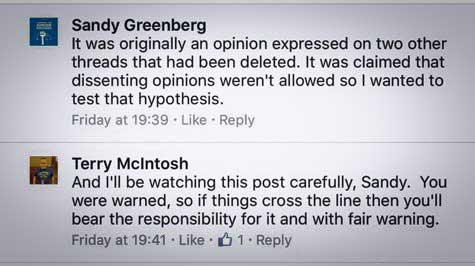Fairness
Opinion

By Carlos Pedraza
AxaMonitor editor
March 14, 2016
A MONTH AGO I launched AxaMonitor, and I’m aware Axanar supporters are not big fans. That’s usually the case when a journalist starts looking into a controversial topic, and Axanar is about as controversial as it gets in fandom.
It’s got it all — corporate Goliaths vs. fannish Davids, a fight over “true” Star Trek, fans hurling vitriol and threats at each other, doxxing, suspicious real estate deals, a high-profile court case and lots and lots of money, all earned off the goodwill of tens of thousands of hopeful fans.
Axanar supporters just want their movie made — and they do see it as their movie. They took justifiable pride in their support of the first short film, the award-winning Prelude to Axanar, and are upset that CBS and Paramount Pictures, the owners of Star Trek, are trying to shut down the feature film, Axanar.
‘Just from looking at the front page, there is a definite view against Axanar and prejudice shown.’ — Critic’s post on Facebook
THEY DON’T SEE this lawsuit as an attack on copyright infringement, or even on producer Alec Peters and his company, Axanar Productions, except as an effort to prevent production of a competing — and better — vision of Star Trek. These fans see the lawsuit as an attack on fans themselves. Real fans of Star Trek, true fans, who believe Star Trek has devolved from the optimistic vision of Gene Roddenberry into the mere lens-flared action sequences of J.J. Abrams. This is certainly the narrative Peters has been weaving since the suit was filed in December.
I was accused the other day on Twitter by Axanar director Robert Meyer Burnett of being “meticulously biased” in my coverage of the lawsuit. I take feedback like that pretty seriously, and I asked him to point it out to me, since every article on this site has citations to back up what’s presented. He declined, changing the subject to a new claim from the Axanar folks that the studio they’ve spent hundreds of thousands of dollars to construct in their leased warehouse was, in fact, not a studio.1) Huh? Well, that’s another story I’ll get to later.
YESTERDAY ON Facebook, another person criticized the negative slant of the news and commentary items posted each day on the AxaMonitor home page:
Just from looking at the front page, there is a definite view against Axanar and prejudice shown. … The wording is not neutral but shows a bias against all those involved in Axanar. I had journalism in college and read, parse and look . Although the author states no bias he write with it. [sic]
The poster cites three examples. First, the highlighted heading below “shows bias for the plaintiff.”

DETAILED INFRINGEMENT CBS and Paramount finally file their amended legal complaint against Axanar, going into 50 pages of detail — including side-by-side comparisons with real Star Trek — about the production’s alleged copyright infringement. Read more »
The second, below, which links to an offsite blog, she says, exhibits “bias in verbage [sic].”

PHONY FAIR USE? Copyright expert and attorney Stephen Carlisle takes issue with “doublespeak typical of Axanar’s producers” about commercial exploitation and fair use of Star Trek copyrights, honing in on its recent disavowal of plans to operate a movie studio. Copyright Office, Nova Southeastern University
And finally, the “Night of Long Knives” article. “That is a leading statement . as though the actions were of a vengeful nature . There are others but those are the primary ones i took showing bias against Axanar. and the people involved . [sic]”

NIGHT OF LONG KNIVES On the eve of filing its lawsuit response, Axanar closed off its Facebook groups to the public, deleted dissenting discussion threads and summarily ejected donors deemed unsupportive. Read more »
Let’s examine each of these in turn.
'Detailed Infringement'
Remember, first of all, that a lawsuit is inherently an adversarial process, so each pleading is naturally going to reflect that, and so will a news story reporting on it. Second, the slug, “Detailed Infringement” is an accurate portrayal of the main thrust of the amended complaint. Moreover, it is also precisely what the defense asked for in its motion to dismiss — more specificity in the infringements CBS is alleging.
‘Scrutiny can feel a lot like bias when you’re the object of the scrutiny.’
Given that Alec Peters admitted Axanar infringes2) (though he didn’t specify to what extent, just “less than others”), I believe that slug is appropriate for a two-word summation of the news that a new complaint was filed by the plaintiffs. Also, I don’t think it’s fair to divorce that two-word slug from the context of the entire short news item, which clearly uses the word ‘alleged’ with connection to the defendants’ activities.
Advocates for CBS, for example, could point to possible bias in my use of the word ‘finally’ with respect to the filing happening so far into the process. I would similarly respond that my use of the term reflects exactly the notice of non-opposition to the dismissal motion that was filed last week by the defense, in which they basically notified the court, CBS better hurry up with that amended complaint because if they don’t, we win the dismissal.
With these short items on the home page, I’m trying to distill an entire article into basically one sentence, whose objective is to get readers to click to read the full text. I deliberately use more provocative words in order to interest people to click through and get the fuller, more nuanced discussion of the topic.
'Phony Fair Use?'
Regarding the alleged bias in the second example, frankly, I don’t quite understand what’s meant by ‘bias in verbiage.’ The linked-to article is an opinion piece by a respected expert in copyright. The use of the term ‘phony’ reflects exactly the title of said opinion piece; the question mark is my heads-up to the fact that this is an opinion piece, clearly attributed to that author, hence the quotation marks.
Also, believe me, I have searched long and hard for reasoned opinion pieces that support Axanar’s use of Star Trek copyrights. I have found plenty of articles generally supporting Axanar — most of which exhibit unfounded notions of what copyright law actually entails — but few making actual arguments based on the law that provide any kind of affirmative defense for what Axanar has done. What I have found I do include on AxaMonitor. I perform this Google search every day. The reality is that virtually all the attorneys and copyright scholars I can find don’t see a way out for Axanar, short of a novel, as-yet-untested legal argument to be proposed by their attorneys.
'Night of Long Knives'
With regard to the third example, I’m willing to plead slightly guilty to Godwin's Law with the defense that unlike most invocations of Naziism, my historical reference was not to point to the kind of wrongs typically committed about by Hitler and his cronies to their enemies but to their own supporters, which is what my article is about — how Axanar was booting out people who actually support the project but who had the temerity to ask questions about how it was being managed, or even more alarmingly, were simply members of groups Peters did not approve of. Some had never posted anything negative about Axanar but had their names appear on the “wrong” group list.
Also, I will admit that the historian in me was curious how many people would actually get the reference. Most Godwin’s Lawbreakers go right to the explicit “you’re just like the Nazis!” place. I think my reference was more nuanced; to the extent that my title is an explicit reference to a Nazi historical event, I will admit that’s so, but it was apt, and I suspect it sailed past most readers.
My Actual Bias
Finally, I will add that what bias I do have is stated up front: AxaMonitor is intended to show what’s at stake in this case; and the stakes are high, both for the individuals named (and yet to be named) in the suit, and for copyright holders battling for what the Constitution and federal law offers them — exclusive control over their own intellectual property.
My other bias is for fan films in general — fan productions are how I got started in my career. This case definitely poses a threat to continued fan productions and so I do look for and spotlight news and commentary that address issues that could hurt fan films.
‘The purpose of AxaMonitor is to provide scrutiny to a production that explicitly invited it.’
Please do not conflate Axanar with all fan films — a term Axanar publicly disdained for itself3) until it was legally advantageous to call itself one. As more evidence about their activities come to light, more differences emerge than similarities to the activities of other fan productions. I understand you may see that as bias, but I work hard to meticulously source every piece on AxaMonitor; I have citations behind the assertions made on the site. Pure opinion and speculation are explicitly identified and attributed.
I speak regularly to Axanar spokesman Mike Bawden, and I have encouraged him to point out for me any unfair or inaccurate content on the site. He told me he is confident I would give any of his feedback a fair hearing.4)
In conclusion, I’d urge Axanar supporters to consider where their own biases may lie. There’s nothing wrong with having them, of course, as long as we’re willing to set them aside when confronted by actual facts. And I’d add that I am clear that the purpose of AxaMonitor is to provide scrutiny to a production that explicitly invited it; scrutiny can feel a lot like bias when you’re the object of the scrutiny.
Thanks for your consideration. 
Keywords
